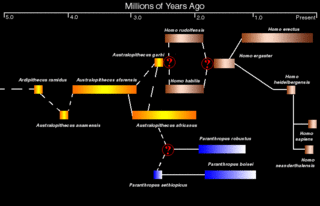Faith-based Evolution
Apparently this "Evolution Week" on Lee's Walk!
Evolution is a tricky subject. While I am no expert in biology, I can make reasonable assessments of any argument. Evolution is a theory, an argument in the philosophical sense, that can be evaluated on it's logical merit. That said, does the acceptance of evolution require "faith"?
 I wouldn't go so far as to call evolution a religion, but I don't see how some people argue that evolution requires no faith at all to accept. I'm guessing that the vast majority of people in the United States couldn't succinctly define "evolution" much less logically defend it with strong factual evidence. My suspicion is that of those people most believe that the theory is an accurate descriptor of reality. That leads me to the conclusion that most people have faith in the theory or, barring that, faith in experts who believe the theory.
I wouldn't go so far as to call evolution a religion, but I don't see how some people argue that evolution requires no faith at all to accept. I'm guessing that the vast majority of people in the United States couldn't succinctly define "evolution" much less logically defend it with strong factual evidence. My suspicion is that of those people most believe that the theory is an accurate descriptor of reality. That leads me to the conclusion that most people have faith in the theory or, barring that, faith in experts who believe the theory.That's fine and good; most of us take as a matter of fact that the earth revolves around the sun even though we have no direct proof (we have to defer to cosmologists, physicists and mathematicians for that). We have faith in a lot of things that are, in reality, fact simply because we, as independent observers, cannot confirm or deny in a purely scientific manner. On a logical level, it may be justifiable to believe in evolution based on all available facts, but not to make fallacious appeals to belief (i.e., "evolution is true because I believe it to be") or appeals to authority (i.e., "Charles Darwin and Stephen Jay Gould believed in evolution, therefore I do").
So, what are we left with?
We are left with several facts about human evolution. Simply put, we possess the following facts about human origins (taken primarily from my old college text books, Reconstructing Human Origins
1. There were several species of creatures who possessed anatomical similarities with modern humans and apesYou can infer several things from this in a logical way. Either, these species were related chronologically, one giving rise to another with various branches and dead ends, or, these creatures had similar design properties but are not directly related. Either conclusion is inductive; there's merely a probability that either is correct.
2. These species had a geologic life span and then died off
3. Fully human (homo sapien sapien) appeared at a specific time in the past
In addition the idea of a "missing link" or transitional form is purely subjective. You are free to interpret the data in a way which makes it likely that there is a genetic line between Australopithecus through to the Homo genus to modern man, but you have to admit that this is an interpretation of the facts, not the facts. (If Darwinian evolution is true, I'd expect to see no distinct species in the past, rather a blur of characteristics that defy classification.)
So back to the point: does evolution require faith? Dr. Roy W. Spencer, Principal Research Scientist, University of Alabama apparently does. I'd say that in general he is correct. Evolutionists believe in the unseen truth (untestable connections between Australopithecus and us today. There may indeed be connections there, but they are logical artifacts rather than concrete facts.



0 Comments:
Post a Comment
<< Home